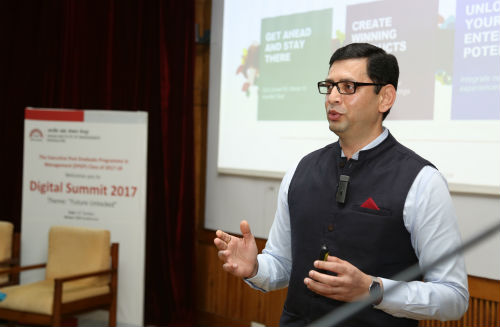‘Need of the hour: Choreographers & storytellers, not program managers’
Bengaluru: Digital Summit 2017, organized by the students of the one-year full-time Executive Post Graduate Programme in Management (EPGP) at IIM Bangalore, set the stage for discussions around present technologies that have the potential to make the biggest impacts on people and businesses in the future.
“Copy paste is not the name of the game anymore; it is get disrupted or go out there and disrupt,” said Jayesh Ghatge – Market Partner-India, Thoughtworks, while delivering the keynote address at the Digital Summit. Focusing on aspects of leadership and the skill needed to tap the potential of technology and deliver the value that technology today promises, Ghatge said, “The key is in experimentation, increasing the speed and reducing the overall cost of experimentation. People who are mission driven and people who take bold bets will not have a job description, they will not be project managers, they will not be program managers, we call them choreographers, they are people who have the breadth of experience across various business types and have good understanding of humanities, technologies, sociology. The reason for this is because they can work across various silos of the organization and bring out the potential that technology holds.”
Highlighting the fact that in the new world driven by technology there are no solutions readily available, Ghatge said, “In addition to choreographers, we need great storytellers as well, the reason for this is that you cannot present a business case anymore that is only backed by data, you can only sell a dream and for this you need to have great storytelling skills.”
Highlighting the issues of security, privacy and transparency, Ghatge explained how businesses have evolved from simple touch base to multi-modal interactions where people are talking to devices. “A lot of people, when they devise a digital strategy, think of the mobile phone as the first channel of interaction but this is the first time in human history that consumer tech is moving much faster than enterprise tech. Which means people are still trying to figure out the use cases for the potential of technology that is out there. Second, the whole aspect of data – the ability to read data and gain insights – allows enhanced experiences you can give to your customers,” he added.
The summit brought together professionals, practitioners, academicians, technology evangelists, young managers and students, who had the opportunity to network, and deliberate on multiple aspects of digitization and the promise of technology in delivering value to the customers.
Themed ‘Future Unlocked’, this edition of the Digital Summit was inaugurated earlier in the day by Prof. Gopal Naik, Dean, Faculty, IIMB. While delivering the inaugural speech, he highlighted the importance of technology to deliver public services to the rural poor. He pointed out that rural areas are left behind because of a lack of infrastructure and lack of accessibility to technology. “We should look at ways on how we can improve digital technology in rural India and make them a part of the country’s economic growth story.” Prof. Naik further emphasized the need for effective collaboration of private, public and the Government sector for digital transformation of rural societies to deliver public services in health, education and agriculture.
The keynote address was followed by a panel discussion on ‘Nonintrusive Marketing’. The panelists were Anil V Pillai, Director, Terragni Consulting (P) Ltd; Sreekant Lanka, Head of Programmatic Account Strategy, Google India, and Suraj Nambiar, General Manager – Digital, Maxus. The discussion was moderated by Shagun Anand, EPGP 2017-18, IIMB.
Anil V Pilllai opened the discussion, observing: “Not all intrusive marketing is bad. Let us not talk in terms of binaries. There is this thing that has been built up that intrusive marketing by its very definition is bad and nonintrusive marketing is a holy grail that the marketers should aspire for.”
Listing the three factors essential for any invasive marketing – context, emotional relevance and concurrence, Pillai said: “The problem with most marketers is that they do not have these elements – they do not know the context of their customers, they are not congruent with customer needs and they do not have any emotional relevance.”
Describing India as a ‘mobile-first country’, Sreekant Lanka said: “People are always looking at their mobile phones and using the internet. From a marketing perspective, here is a customer life cycle which is so much quicker and there is a need for marketers to embrace this life cycle and think of ways of marketing – intrusive and nonintrusive.”
Building on the discussion, Suraj Nambiar focused on the importance and frequency of content marketing. “Users are smart, so what you create or the stories that you tell, even though they are relevant to the particular user, may become intrusive if you increase the frequency.” Highlighting the need for marketers to therefore have a clear understanding of content, customer needs and frequency, Nambiar said: “As long as these three elements are in check, no content will be intrusive.”
The panel discussion was followed by a talk on Digital Ethnography by Dr. Vishal Shah, VP – Leadership Development, Wipro. He explained the need for marketers to study social behavior and culture of people and communities.
The afternoon session opened with a talk by Avnish Sabharwal, Managing Director at Accenture Ventures, on ‘Digital Inclusion – An Indian Perspective’.
The second panel discussion on ‘Platform Organizations Solving Market Inefficiencies’ featured Priya Karnik, Vice President – Business, Paytm; Harshit Kumar, Senior Product Manager, Microsoft; Prashant Kondle, VP – Technology and Operations, GoCoop; Piyush Chowhan, VP and CIO, Arvind Brands.
The summit came to an end with a talk by Rahul Chenny, Executive IT Architect, Global Technology Services Labs, IBM.

